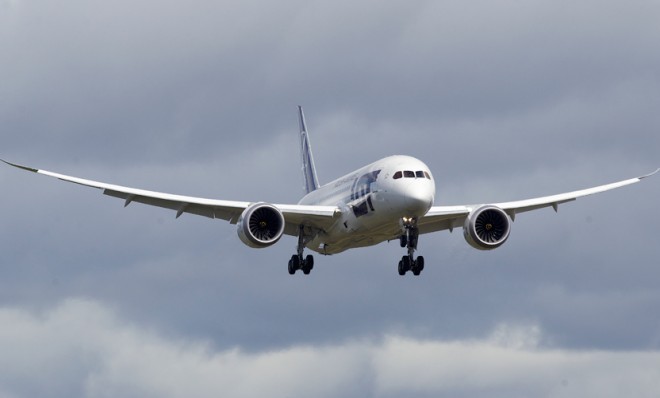How Boeing's profits soared despite its grounded Dreamliner
Even an international PR disaster couldn't slow down Boeing

In the wake of an embarrassing PR debacle, Boeing has managed to win back the favor of both regulators and Wall Street... at least for now.
The aerospace and defense giant reported a profit of $1.11 billion in the first quarter off $18.9 billion in revenue, beating analysts' expectations. That's a 20 percent rise in profits since the first quarter last year, going from $1.23 a share to $1.44 a share.
In response to the rosy report, Boeing's shares inched up more than 3 percent, indicating that Wall Street is feeling at least a-okay about the jet-maker's future.
The Week
Escape your echo chamber. Get the facts behind the news, plus analysis from multiple perspectives.

Sign up for The Week's Free Newsletters
From our morning news briefing to a weekly Good News Newsletter, get the best of The Week delivered directly to your inbox.
From our morning news briefing to a weekly Good News Newsletter, get the best of The Week delivered directly to your inbox.
That's good news for Boeing, because the last few months have been a high-profile PR disaster. In January, the lithium-ion batteries on two 787 Dreamliners failed —one smoldered, the other caught fire — causing regulators to issue an emergency airworthiness directive and ground the entire fleet of jets. A highly-publicized three-month global investigation of the battery failures followed. It was... well, embarrassing.
And yet: Boeing's stock price is up this year. When 2012 ended, a share of Boeing was worth about $75. Today, that number is $91. Why does Boeing still have the confidence of investors?
One reason may be that Boeing got a pass from regulators just a week before releasing its first-quarter report. At a hearing Tuesday, the Federal Aviation Administration approved Boeing's battery fixes, based on preliminary tests performed by Boeing and partners. Questions may still linger about how trustworthy Boeing's batteries are, but for investors, the feds sent a clear signal: Boeing is back on track. Dreamliners could be making commercial flights as early as Saturday, and soon as the FAA approves fixes on individual planes, Boeing can start delivering.
If all goes as planned, Boeing should remain on target for delivery estimates this year. "As we came into the year, we did have a delivery plan and that plan was to deliver more than 60 airplanes this year," Randy Tinseth, Boeing's VP of marketing told the press. "Although the timing has changed a little bit, we still expect to deliver those 60-plus airplanes in 2013."
A free daily email with the biggest news stories of the day – and the best features from TheWeek.com
Another reason for Boeing's success? The the company pumped up manufacturing for 777 and 737 models to make up for the stall in 787 Dreamliners. Boeing delivered 137 planes in the first quarter, and managed to boost profits even higher by cutting costs in its military division.
But the biggest reason might simply be that the true cost of the Dreamliner debacle is not yet reflected on the balance sheets. "Boeing has never publicly estimated the cost of the battery problem, but analysts have said the final tally could be hundreds of millions of dollars after airlines are compensated," the New York Times said this morning. "Most of these costs have not yet been reflected in Boeing's financial results."
So, for now, Boeing seems to be flying high. But for the final results, we'll have to check back in at the close of Q2 — and beyond.
Carmel Lobello is the business editor at TheWeek.com. Previously, she was an editor at DeathandTaxesMag.com.
-
 A Nipah virus outbreak in India has brought back Covid-era surveillance
A Nipah virus outbreak in India has brought back Covid-era surveillanceUnder the radar The disease can spread through animals and humans
-
 Nasa’s new dark matter map
Nasa’s new dark matter mapUnder the Radar High-resolution images may help scientists understand the ‘gravitational scaffolding into which everything else falls and is built into galaxies’
-
 Is the US about to lose its measles elimination status?
Is the US about to lose its measles elimination status?Today's Big Question Cases are skyrocketing